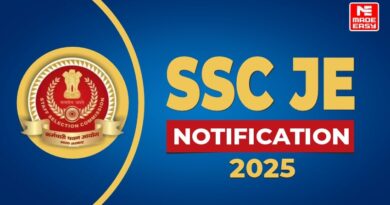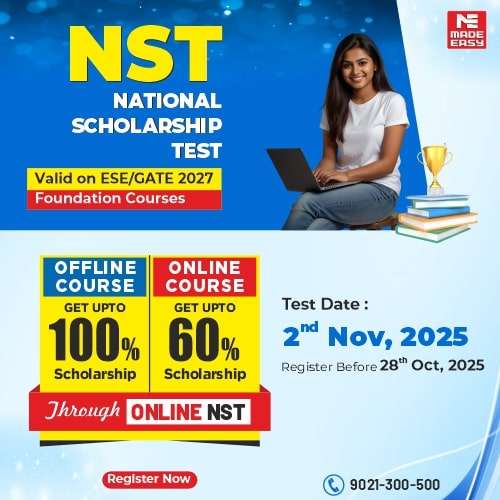How to prepare for SSC JE Civil Exam?
The SSC JE 2025 notification is expected to be released on 5th August 2025 on the official website at ssc.gov.in. Aspiring civil engineers should begin their preparation for the SSC JE exam. The SSC JE 2025 Civil exam is challenging, but it also gives engineering students a lot of options; therefore, preparation should be thorough.
Staff Selection Commission Junior Engineer [SSC JE] is a national-level exam conducted to recruit junior engineers in various central departments. SSC JE offers numerous engineering opportunities to candidates with a secure job with perks and benefits, including career advancements. The eligible engineering branches are civil, mechanical, and electrical engineering. The mode of the exam is a computer-based test [CBT] and is conducted in two phases, PAPER I and PAPER II. Candidate’s qualifying Paper I will be eligible to give PAPER II. It is crucial to have a brief understanding of the exam prior to beginning its preparation.
Following our blog will help aspiring civil engineers who aspire to become junior engineers in the future. We offer simple yet significant strategies for preparing for the SSC JE 2025 civil examination. Whether you are taking the exam for the first time or have already begun preparing for the upcoming SSC JE exam, the strategies are simple to put into practice.
Join us on your preparation journey for the SSC JE civil exam to achieve the expected result.
Preparation for SSC JE 2025 Civil Exam
Before taking any exams, candidates should have a complete understanding of the test, the engineering fields that qualify, the educational requirements, the exam format, the syllabus, the mode of examination, and other relevant details. One of the branches that can take the SSC JE examination, which is held to recruit junior engineers for different central departments, is civil engineering.
SSC Junior Engineer: this profile holds immense significance for numerous reasons such as career advancement, job security, learning opportunities, recognition with other perks and benefits. Civil candidates aspiring as junior engineers must have a strong and effective strategy to succeed in the opportunity creating yet challenging SSC JE exam.
1. Overview of the syllabus:
It is essential to comprehend the curriculum. Knowing what subjects and ideas must be covered helps to manage the limited time and removes any confusion. The official syllabus for all relevant engineering subjects, including civil engineering, has been made available for SSC JE 2025. It is advised that all candidates familiarize themselves with the curriculum. Knowing the syllabus has advantages that will enhance students’ confidence and help them design an efficient study schedule. General engineering, general awareness, and general intelligence and reasoning are covered in SSC JE 2025 Civil Paper I. The candidate’s selected engineering discipline is the focus of Paper II.
General intelligence and reasoning questions include analogies, similarities, differences, space visualization, arithmetical reasoning, verbal, figure classification, arithmetical number series etc. General awareness questions include knowledge of current events, History, Culture, Geography, Economic Scene, General Polity and Scientific Research, etc of India and its neighboring countries. Civil engineering questions include Building Materials, Estimating, Costing and Valuation, Surveying, Soil Mechanics, Hydraulics, Irrigation Engineering, Transportation Engineering, and Environmental Engineering.
Structural Engineering: Theory of Structures, Concrete Technology, RCC Design, Steel Design.
PAPER II includes topics Building Materials, Estimating, Costing and Valuation, Surveying, Soil Mechanics, Hydraulics, Irrigation Engineering, Transportation Engineering, Environmental Engineering, Theory of structures, Concrete Technology, RCC Design and Steel Design.
- Detailed Syllabus: Syllabus- JE examination
- Exam Pattern: Paper Pattern
2. Reliable study source:
While preparing for challenging exams like SSC JE, studying from reputable sources is important for students, whether they are enrolled in a course or studying on their own. You are referring to a civil book for the SSC JE, which should offer comprehensive coverage, trustworthy content that ensures civil applicants comprehend concepts and theories, and effective study techniques. Seek out clear explanations with illustrations and examples, practice questions with solutions, and mock tests that will boost their understanding.
3. Making notes:
Note-making is amongst the most important strategies for the students preparing for SSC JE. Students who prepare their own notes tend to have enhanced learning. Majority of students focus on completing the syllabus on time rather than including note making. While completing their syllabus, civil aspirants must involve themselves into note making as well to engage in active learning. Because your notes are customized to your learning preferences and style, editing them will be easier for you. Students can use their own notes as a revision guide instead of lengthy, structured study materials. It is advised that you begin composing your own notes as you are studying. And short notes ranging from 10 to 12 pages per topic.
4. Previous Year Question Paper:
SSC JE civil previous year’s question paper is an important tool in your preparation journey. Practicing PYQs makes candidates aware about the exam pattern, types of questions being asked, marks distribution and topics from which questions are being asked. PYQs also give candidates a sense of the exam’s difficulty level, which helps in identifying and strengthening difficult concepts. Practice PYQs will assist candidates in improving their logical thinking and cognitive skills, as the SSC JE syllabus includes questions on general reasoning and awareness as well. Including mock exams in your SSC JE preparation process gives you an overview of the actual exam environment as well as the most recent syllabus and exam pattern.
5. Preparation for general reasoning and awareness:
From the official SSC JE syllabus, it is evident that PAPER I has a good weightage of marks and covers topics related to reasoning and awareness. It is therefore necessary to prepare thoroughly for these ideas, which will help in your exam success. To accurately answer the majority of general awareness questions, students need to be up to date on current affairs and daily news. To be informed about current events and advancements in various industries, read the latest news on a daily basis and subscribe to reliable news websites.
Practicing PYQs and mock tests provides a brief idea of the question types and levels of general reasoning concepts. General reasoning concepts require regular practice, helping in identifying question types and learning the techniques to solve them.
6. Clear fundamentals of civil engineering:
Civil aspirants prior to practicing for the exam must ensure that their basic understanding of the subject is clear. According to the official SSC JE exam pattern, general engineering consists of 100 marks in Paper I. Understanding the fundamentals provides a solid foundation for higher concepts. Students’ problem-solving abilities improve, resulting in their ability to apply concepts to solve problems efficiently. Clear basics ensure an in-depth understanding of difficult and complex ideas, giving you confidence for the exam. It is strongly encouraged to focus on mastering the fundamentals and practice numerical calculations as often as possible.
While these are effective strategies, regular revisions, a study schedule that should be followed, prioritizing weak topics and working on them, setting achievable short-term study goals, staying healthy, and maintaining an optimistic mindset are all simple tips to keep in mind as you prepare.
SSC JE exam dates are approaching soon, so it is important to buckle up your preparation and focus on your goal.
MADE EASY SSC JE Online Courses
MADE EASY can be a strong pillar in your SSC JE civil exam preparation. Our online courses are curated to provide you with comprehensive preparation and the skills needed to excel in SSC JE 2025.
Check out the Last 6 Months Preparation Strategy for SSC JE 2025
FAQs
1. Are civil and electrical engineering eligible for SSC JE?
Ans. Yes, civil and electrical engineering branches are eligible for SSC JE 2025.
2. How can I clear my SSC JE Civil Exam in the first attempt?
Ans. Clearing the SSC JE Civil examination in the first attempt entirely depends on the aspirant’s preparation strategies. Strategic preparation can help you score well in the SSC JE exam.
3. Who is eligible for SSC Junior Engineer Civil?
Ans. Students holding a B.Tech. degree in civil engineering from a recognized university or institute or a three-year diploma in civil engineering from a recognized university or institute.
4. What does GS mean in SSC JE?
In the context of SSC JE exams, “GS” means “General Studies”. If you are preparing for this exam, then you should understand the full form of GS and buy a good course related to it. So that you can prepare for the exam properly.
Dear Aspirants,
Your preparation for GATE, ESE, PSUs, and AE/JE is now smarter than ever — thanks to the MADE EASY YouTube channel.
This is not just a channel, but a complete strategy for success, where you get toppers strategies, PYQ–GTQ discussions, current affairs updates, and important job-related information, all delivered by the country’s best teachers and industry experts.
If you also want to stay one step ahead in the race to success, subscribe to MADE EASY on YouTube and stay connected with us on social media.
MADE EASY — where preparation happens with confidence.

MADE EASY is a well-organized institute, complete in all aspects, and provides quality guidance for both written and personality tests. MADE EASY has produced top-ranked students in ESE, GATE, and various public sector exams. The publishing team regularly writes exam-related blogs based on conversations with the faculty, helping students prepare effectively for their exams.





